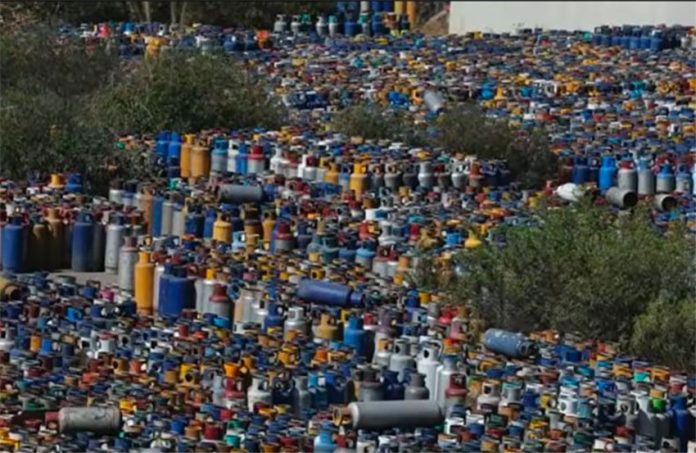A growing collection of abandoned LP gas tanks at an industrial site in Mexico City is emitting foul odors and affecting the lives and health of nearby residents, who fear that an explosion could occur at any time.
Thousands of multicolored disused tanks fill the site of the old Pemex refinery in Azcapotzalco, a northern borough that borders México state.
The tanks – used by many Mexican households for cooking and to heat water – have been taken there by Gas Bienestar, the state-owned LP gas distribution company that entered the Mexico City market last year to increase competition and put downward pressure on prices.
The company has distributed new tanks emblazoned with its logo to customers, and taken away their old – and in some cases damaged – tanks away only to dump them at the former site of the 18 de Marzo refinery, which ceased operations in 1991 and was subsequently dismantled.
What the final fate of the 20 and 30 kilogram cylinders will be is unclear.
Residents of neighborhoods such as Huichapan, San Diego Ocoyoacac and Torre Blanca have complained of a strong odor emanating from the site. LP gas mainly contains butane and propane, which are odorless, but producers add strong-smelling mercaptan (also known as methanethiol) to the mix so that leaks can be more easily detected.
“The smell is so strong at night – so unbearable – that it’s like the stove isn’t turned off properly,” César Rivera told the news agency AFP.
Rivera and his wife – like many other people who live and work near the old refinery site – fear an explosion will occur in what has been described as a tank “cemetery.”
They’re also afraid of falling ill as a result of the constant foul smell, and often leave their apartment at night to escape the stink.
“The building administration has asked us not to smoke or use the stove burners when the smell’s stronger. It has completely changed our lives,” Rivera said. “It’s a time bomb.”
The 37-year-old web programmer said that he and his wife have endured the gas odor for eight months but only became aware of the source in January.
José Juan Macías has a carpenter’s shop next to the old refinery, and he and his employees have experienced the ill effects of the mercaptan stench. “We feel like vomiting and have really bad headaches,” he told AFP.
“The authorities say there’s nothing to worry about, … but everyone here thinks there’s some danger, so we always take care not to light anything when it smells a lot out of fear of an explosion,” Macías said.
Firefighters at the Tacuba fire station, located about five kilometers from the refinery site, told AFP they receive daily reports of gas leaks, but the smell people are complaining about is in fact coming from the discarded tanks. Station chief César Suárez said that firefighters have gone to the tank cemetery but haven’t been given the opportunity to express their concerns.
Accompanied by local National Action Party lawmakers, residents protested outside the site earlier this month, but the sea of tanks remains undiminished. The Gas Bienestar chief has promised to set a date for their removal, but months have passed and that hasn’t occurred, the newspaper El País reported.
Mexico City Mayor Claudia Sheinbaum said in January that Civil Protection officials had visited the old refinery and not detected any risk, but that view is far from uncontested.
The National Commission for the Efficient Use of Energy says on its website that gases produced by LP combustion are not toxic or carcinogenic, but adds that leaks lead to the formation of gas clouds “that could be explosive and could suffocate people in confined spaces.”
Ricardo Torres, a researcher at the Institute of Atmospheric Sciences at the National Autonomous University, told AFP that if people who live near the old refinery can constantly smell gas it’s because the tanks are not completely empty. He also said that LP gas contributes to the formation of ozone, which is harmful to people when present at ground level.
The gas odor could harm people’s health and there is an “imminent risk” of explosion because fossil fuels are also stored at the site, said Alberto Burgoa, a Miguel Hidalgo borough councilor.
Susana Cazorla, former head of the LP gas division at the Energy Regulatory Commission, raised concerns about Gas Bienestar’s removal of old tanks from people’s homes given that there is no formal replacement program.
“All this should be written down and there should be clear rules. But there’s nothing. We don’t know if they’re removing tanks that have really reached the end of their lifespan or whether they’re removing competitors’ [tanks] from circulation,” she said.
Gas Bienestar director Gustavo Álvarez Velázquez has said that at least half of the removed tanks are in poor condition, but Cazorla questioned the claim.
“Obviously they’ll always tell you that it’s due to safety but we can’t confirm it because there’s no regulation,” she said.
While removing old and possibly damaged tanks from people’s homes makes sense, placing thousands of them in close vicinity to people’s homes appears far less logical.
One neighbor said in a television interview that she and her family couldn’t sleep peacefully at night due to the smell and the fear of an explosion, explaining that “we’re worried we won’t wake up one day.”
Guadalupe Medina, another nearby resident, told AFP that the smell infiltrates her entire home and “causes us headaches and nausea.”
“It’s really very annoying and it’s every day,” she added. “It’s not once a week, it’s daily.”
